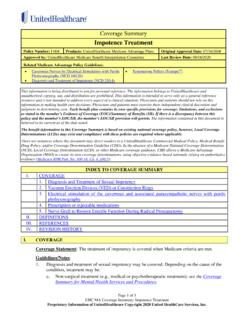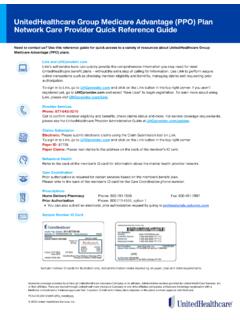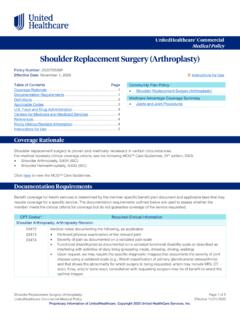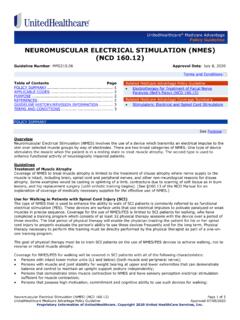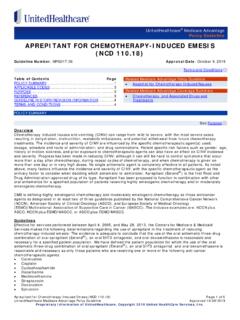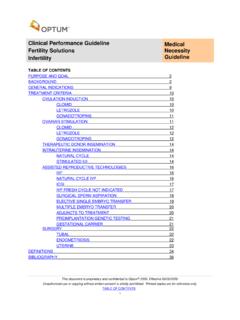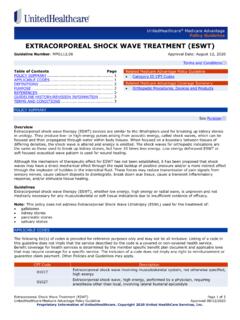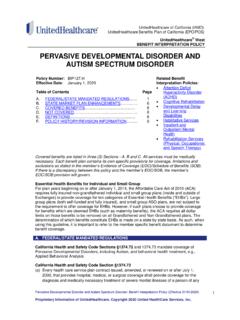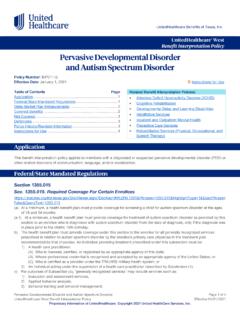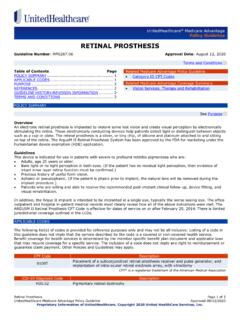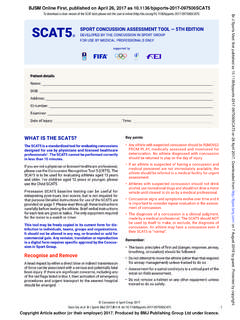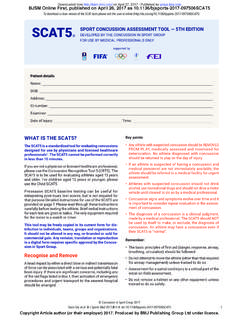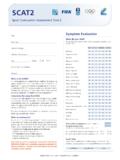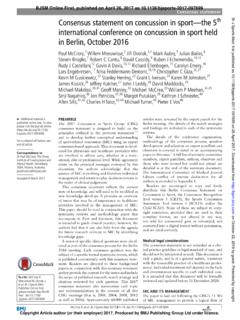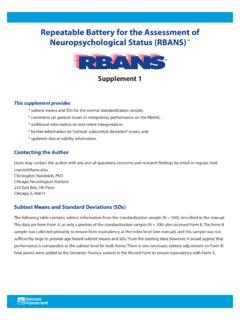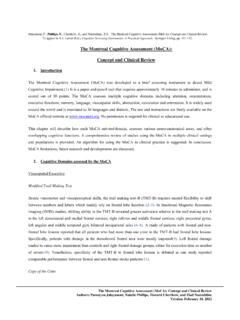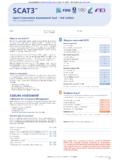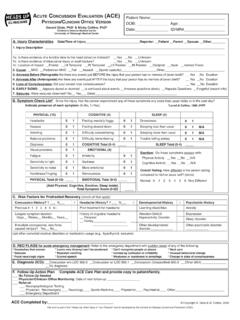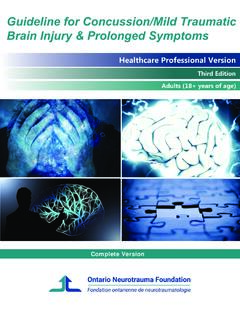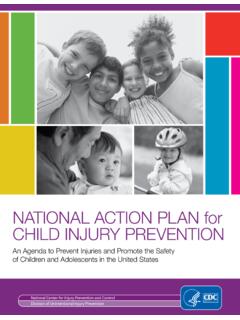Transcription of Neuropsychological Testing Under the Medical Benefit ...
1 Neuropsychological Testing Under the Medical Benefit Page 1 of 24 UnitedHealthcare Commercial Medical Policy Effective 09/01/2021 Proprietary Information of UnitedHealthcare. Copyright 2021 United HealthCare Services, Inc. UnitedHealthcare Commercial Medica l Policy Neuropsychological Testing Under the Medical Benefit Policy Number: 2021T0152W Effective Date: September 1, 2021 Instructions for Use Table of Contents Page Coverage Rationale .. 1 Definitions .. 2 Applicable Codes .. 3 Description of Services .. 3 Benefit Considerations .. 5 Clinical Evidence .. 5 Food and Drug Administration .. 18 References .. 19 Policy History/Revision Information .. 23 Instructions for Use .. 24 Coverage Rationale See Benefit Considerations Neuropsychological Testing is proven and medically necessary for evaluating individuals with the following conditions when the results of Testing will be used to support a diagnosis, prognosis, or treatment plan: Attention-deficit/hyperactivity disorder (ADHD) when all of the following are present: o Specific neurocognitive behavioral deficits related to ADHD need to be evaluated; and o Testing has been recommended by a physician and is related or secondary to a known or suspected organic- Medical condition resulting from brain injury or disease process ( , concussion , intractable seizure disorder, cancer treatment effects, genetic disorders, inborn errors of metabolism) Note: The scope of these criteria is applicable only to Neuropsychological Testing that is covered by the Medical Benefit .
2 These criteria do not apply to evaluate or determine educational interventions. Confirmed space-occupying brain lesion including but not limited to the following: o Brain abscess o Brain tumors o Arteriovenous malformations within the brain Demyelinating disorders including multiple sclerosis Intellectual disability or intellectual developmental disorder when all of the following are present: o The intellectual disability or intellectual developmental disorder is associated with a known or suspected Medical cause ( , Traumatic Brain Injury, in utero toxin exposure, early seizure disorder, sickle cell disease, genetic disorders); and o The intellectual disability or intellectual developmental disorder meets all of the following criteria (DSM-5): Deficits in intellectual function, such as reasoning, problem solving, planning, abstract thinking, judgment, academic learning, and learning from experience, confirmed by both clinical assessment and individualized, standardized intelligence Testing Deficits in adaptive functioning that result in failure to meet developmental and sociocultural standards for personal independence and social responsibility.
3 Without ongoing support, the adaptive deficits limit functioning in one or more activities of daily life, such as communication, social participation, and independent living across multiple environments, such as home, school, work and community; and Related Commercial Policy Maximum Dosage Community Plan Policy Neuropsychological Testing Under the Medical Benefit Medicare Advantage Coverage Summary Neuropsychological Testing Related Optum Guideline Psychological and Neuropsychological Testing Neuropsychological Testing Under the Medical Benefit Page 2 of 24 UnitedHealthcare Commercial Medical Policy Effective 09/01/2021 Proprietary Information of UnitedHealthcare. Copyright 2021 United HealthCare Services, Inc. Onset of intellectual and adaptive deficits during the developmental period Note: The scope of these criteria is applicable only to Neuropsychological Testing that is covered by the Medical Benefit .
4 These criteria do not apply to evaluate or determine educational interventions. Encephalopathy including acquired immunodeficiency syndrome (AIDS) encephalopathy, human immunodeficiency virus (HIV) encephalopathy, hepatic encephalopathy, Lyme disease encephalopathy including neuroborreliosis, Wernicke's encephalopathy and systemic lupus erythematosus (SLE) encephalopathy Neurocognitive Disorders including Mild Cognitive Impairment(MCI), Dementia or symptoms of dementia such as memory impairment or memory loss (including Alzheimer s and extrapyramidal disorders such as Parkinson's disease) that is associated with a new onset or progressive memory loss and a decline in at least one of the following cognitive domains (DSM-5): o Complex attention o Executive function o Learning and memory o Language o Perceptual motor o Social cognition Neurotoxin exposure with at least one of the following.
5 O Demonstrated serum levels of neurotoxins o Individual with one or more of the following: Documented prenatal alcohol, drug, or toxin exposure History of radiation therapy or chemotherapy Seizure disorder including individuals with epilepsy Stroke Traumatic Brain Injury (TBI) The individual is being considered for a Medical or surgical procedure that may affect brain function ( , epilepsy surgery, resection of brain tumors or arteriovenous malformations, deep brain stimulation, stem cell or organ transplants) The following are unproven and not medically necessary due to insufficient evidence of efficacy: Baseline Neuropsychological Testing in asymptomatic individuals at risk for sport-related concussions Computerized cognitive Testing such as Cognivue , Mindstreams Cognitive Health assessment , BrainCare and QbTest Computerized Neuropsychological Testing when used as a stand-alone test for evaluating concussions Neuropsychological Testing for the following diagnoses alone without other proven conditions as noted above.
6 O Headaches including migraine headache o History of myocardial infarction o Intermittent explosive disorder Neuropsychological Testing that is comprised exclusively of self-administered or self-scored inventories, or as screening tests of cognitive function or neurological disease whether paper-and-pencil or computerized ( , AIMS, Folstein Mini-Mental Status Examination) Neuropsychological Testing that is used as a routine screening tool Neuropsychological Testing that is administered for educational or vocational purposes that do not alter or direct Medical or health management Repeat Neuropsychological Testing that is not required for Medical decision-making The individual is neurologically, cognitively, or psychologically unable to participate in a meaningful way in the Neuropsychological Testing process The individual has been diagnosed previously with brain dysfunction, such as Alzheimer s disease, and there is no expectation that Neuropsychological Testing would impact the individual s Medical , functional, or behavioral management Definitions Traumatic Brain Injury (TBI): TBI is defined as a bump, blow, or jolt to the head or a penetrating head injury that disrupts the normal function of the brain.
7 (Centers for Disease Control and Prevention) Neuropsychological Testing Under the Medical Benefit Page 3 of 24 UnitedHealthcare Commercial Medical Policy Effective 09/01/2021 Proprietary Information of UnitedHealthcare. Copyright 2021 United HealthCare Services, Inc. Applicable Codes The following list(s) of procedure and/or diagnosis codes is provided for reference purposes only and may not be all inclusive. Listing of a code in this policy does not imply that the service described by the code is a covered or non-covered health service. Benefit coverage for health services is determined by the member specific Benefit plan document and applicable laws that may require coverage for a specific service. The inclusion of a code does not imply any right to reimbursement or guarantee claim payment. Other Policies and Guidelines may apply. CPT Code Description 96116 Neurobehavioral status exam (clinical assessment of thinking, reasoning and judgment, [ , acquired knowledge, attention, language, memory, planning and problem solving, and visual spatial abilities]), by physician or other qualified health care professional, both face-to-face time with the patient and time interpreting test results and preparing the report; first hour 96121 Neurobehavioral status exam (clinical assessment of thinking, reasoning and judgment, [ , acquired knowledge, attention, language, memory, planning and problem solving, and visual spatial abilities]), by physician or other qualified health care professional, both face-to-face time with the patient and time interpreting test results and preparing the report.
8 Each additional hour (List separately in addition to code for primary procedure) 96132 Neuropsychological Testing evaluation services by physician or other qualified health care professional, including integration of patient data, interpretation of standardized test results and clinical data, clinical decision making, treatment planning and report, and interactive feedback to the patient, family member(s) or caregiver(s), when performed; first hour 96133 Neuropsychological Testing evaluation services by physician or other qualified health care professional, including integration of patient data, interpretation of standardized test results and clinical data, clinical decision making, treatment planning and report, and interactive feedback to the patient, family member(s) or caregiver(s), when performed; each additional hour (List separately in addition to code for primary procedure) 96136 Psychological or Neuropsychological test administration and scoring by physician or other qualified health care professional, two or more tests, any method; first 30 minutes 96137 Psychological or Neuropsychological test administration and scoring by physician or other qualified health care professional, two or more tests, any method; each additional 30 minutes (List separately in addition to code for primary procedure) 96138 Psychological or Neuropsychological test administration and scoring by technician, two or more tests, any method; first 30 minutes 96139 Psychological or Neuropsychological test administration and scoring by technician, two or more tests, any method.
9 Each additional 30 minutes (List separately in addition to code for primary procedure) 96146 Psychological or Neuropsychological test administration, with single automated, standardized instrument via electronic platform, with automated result only CPT is a registered trademark of the American Medical Association Description of Services Neuropsychological Testing is a set of formal procedures utilizing diagnostic tests specifically focused on identifying the presence of brain damage, injury or dysfunction and any associated functional deficits. Measurement of deficits cannot be based on single test results and should always be assessed in the context of the Medical and neurological examination. Neuropsychological Testing is customarily associated with neurological diagnoses rather than behavioral health diagnoses. Neuropsychological tests are administered in a variety of contexts including paper-and-pencil, computers, and visual aids.
10 Following an initial clinical interview with a neuropsychologist, tests are strategically selected to identify specific deficits and preserved abilities. Standardized tests are then administered by a trained technician or neuropsychologist. Some tests offer multiple forms making them useful for repeated administration to the same patient, thereby minimizing practice effects. In light of the numerous procedures available for assessment of different neurocognitive functions, test selection is based on familiarity Neuropsychological Testing Under the Medical Benefit Page 4 of 24 UnitedHealthcare Commercial Medical Policy Effective 09/01/2021 Proprietary Information of UnitedHealthcare. Copyright 2021 United HealthCare Services, Inc. of the examiner with certain tests, availability of appropriate normative data, ability of the patient to participate in Testing , and validity of particular procedures for the specific function being measured.
